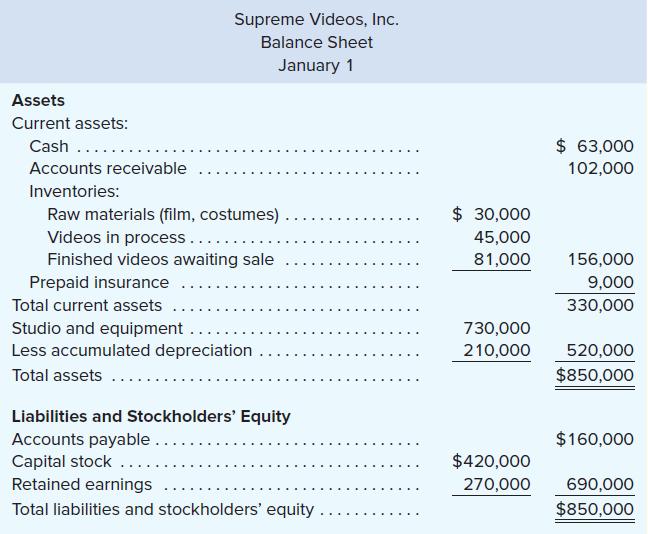Supreme Videos, Inc., produces short musical videos for sale to retail outlets. The companys balance sheet accounts
Question:
Supreme Videos, Inc., produces short musical videos for sale to retail outlets. The company’s balance sheet accounts as of January 1, are given below.

Because the videos differ in length and in complexity of production, the company uses a job-order costing system to determine the cost of each video produced. Studio (manufacturing) overhead is charged to videos on the basis of camera-hours of activity. The company’s predetermined overhead rate for the year is based on a cost formula that estimated $280,000 in manufacturing overhead for an estimated allocation base of 7,000 camera-hours. The following transactions occurred during the year:
a. Film, costumes, and similar raw materials purchased on account, $185,000.
b. Film, costumes, and other raw materials used in production, $200,000 (85% of this material was considered direct to the videos in production, and the other 15% was considered indirect).
c. Utility costs incurred in the production studio, $72,000.
d. Depreciation recorded on the studio, cameras, and other equipment, $84,000. Three-fourths of this depreciation related to production of the videos, and the remainder related to equipment used in marketing and administration.
e. Advertising expense incurred, $130,000.
f. Costs for salaries and wages were incurred as follows:
Direct labor (actors and directors) . . . . . . . . . . . $82,000
Indirect labor (carpenters to build sets,
costume designers, and so forth) . . . . . . . . . . . $110,000
Administrative salaries . . . . . . . . . . . . . . . . . . . . $95,000
g. Prepaid insurance expired during the year, $7,000 (80% related to production of videos,
and 20% related to marketing and administrative activities).
h. Miscellaneous marketing and administrative expenses incurred, $8,600.
i. Studio (manufacturing) overhead was applied to videos in production. The company used 7,250 camera-hours during the year.
j. Videos that cost $550,000 to produce according to their job cost sheets were transferred to the finished videos warehouse to await sale and shipment.
k. Sales for the year totaled $925,000 and were all on account. The total cost to produce these videos according to their job cost sheets was $600,000.
l. Collections from customers during the year totaled $850,000.
m. Payments to suppliers on account during the year, $500,000; payments to employees for salaries and wages, $285,000.
Required:
1. Prepare a T-account for each account on the company’s balance sheet and enter the beginning balances.
2. Record the transactions directly into the T-accounts. Prepare new T-accounts as needed. Key your entries to the letters (a) through (m) above. Compute the ending balance in each account.
3. Is the Studio (manufacturing) Overhead account underapplied or overapplied for the year? Make an entry in the T-accounts to close any balance in the Studio Overhead account to Cost of Goods Sold.
4. Prepare a schedule of cost of goods manufactured. If done correctly, the cost of goods manufactured from your schedule should agree with which of the above transactions?
5. Prepare a schedule of cost of goods sold. If done correctly, the unadjusted cost of goods sold from your schedule should agree with which of the above transactions?
6. Prepare an income statement for the year.
Step by Step Answer:

Managerial Accounting
ISBN: 9781260247787
17th Edition
Authors: Ray Garrison, Eric Noreen, Peter Brewer





